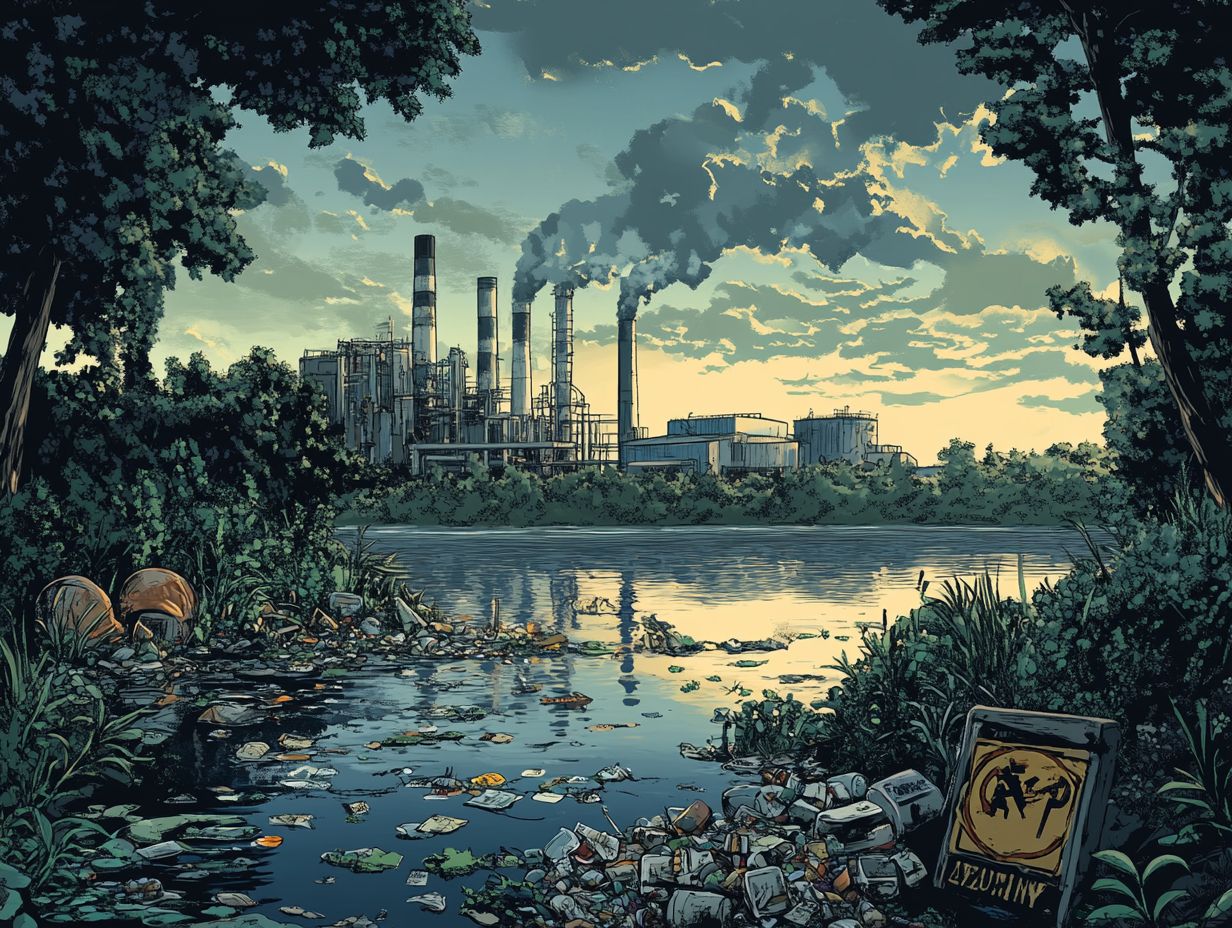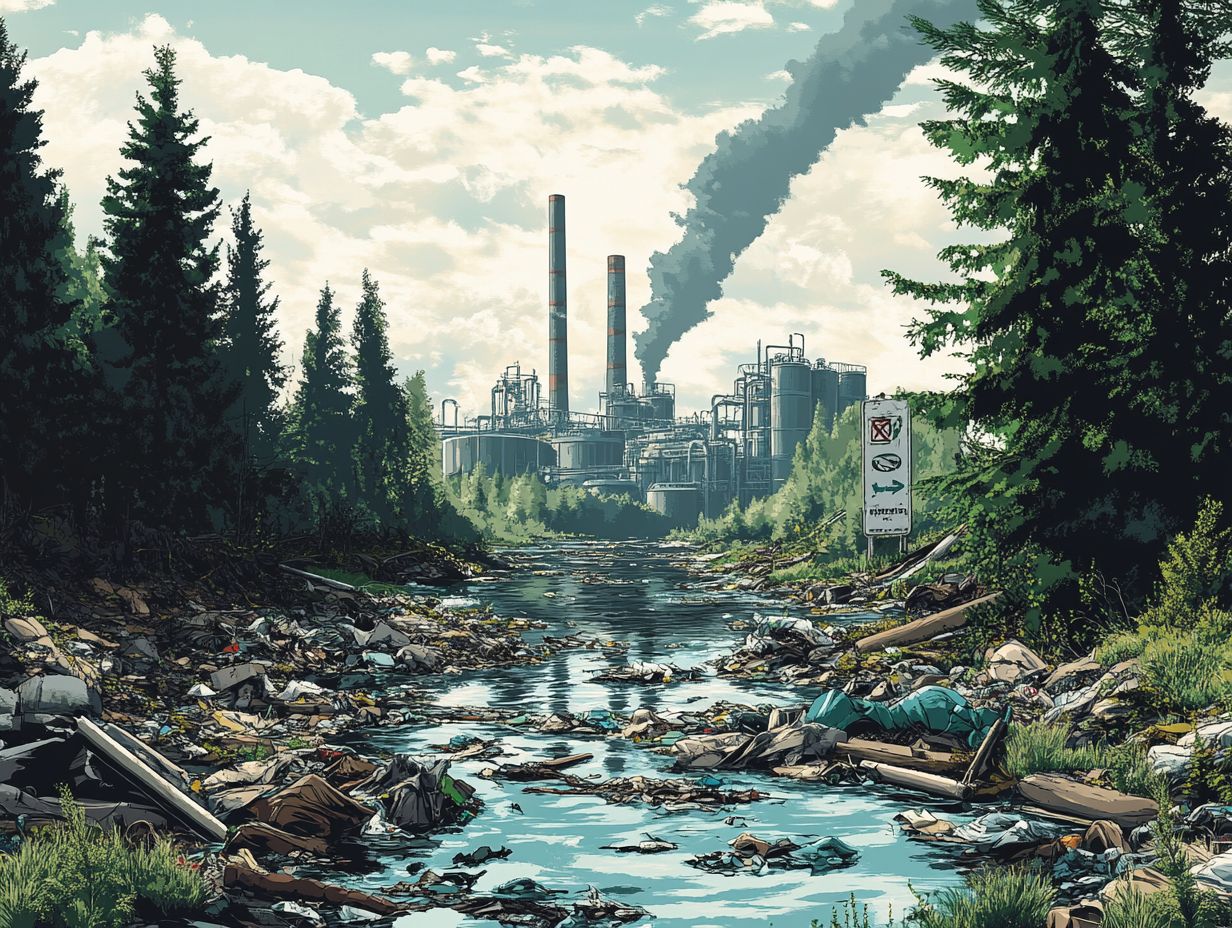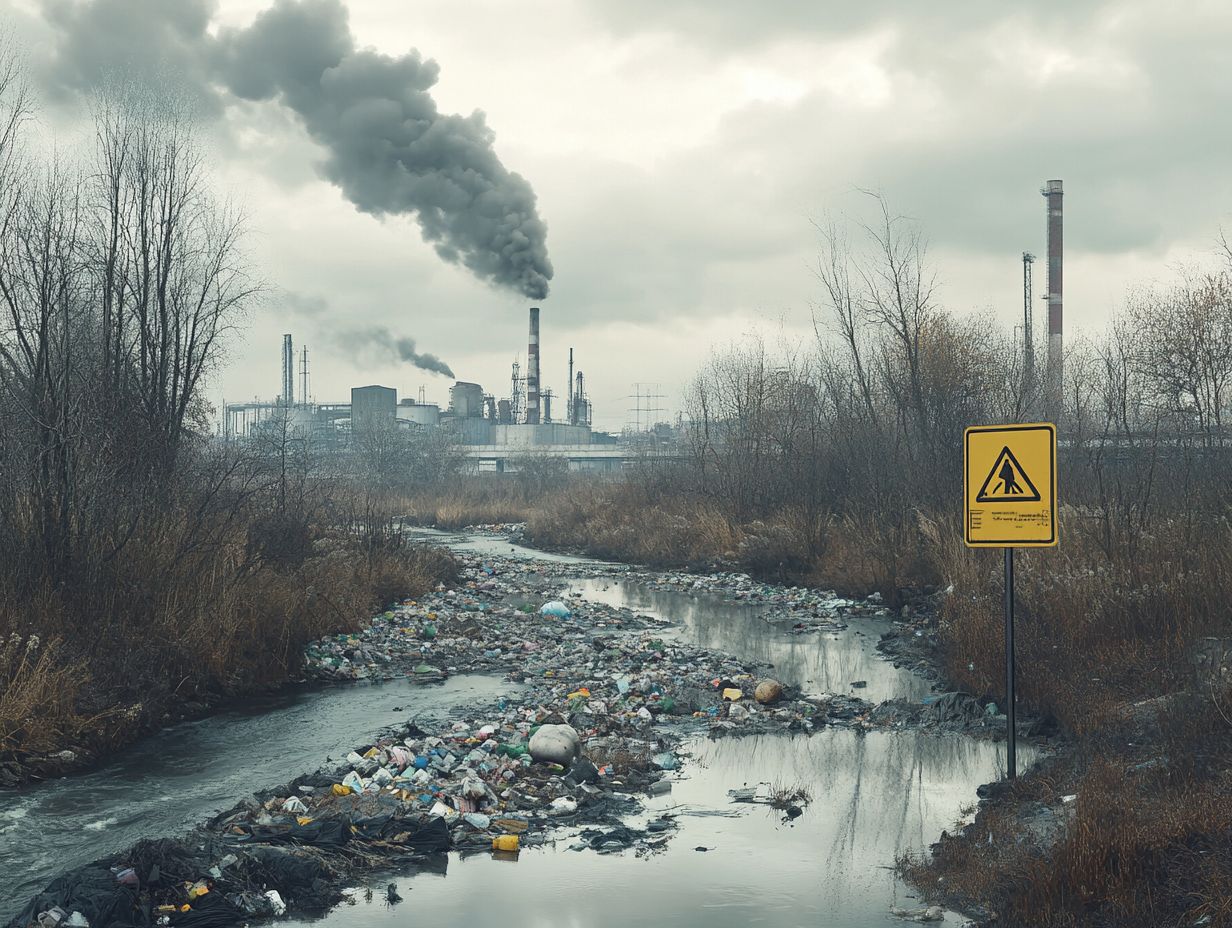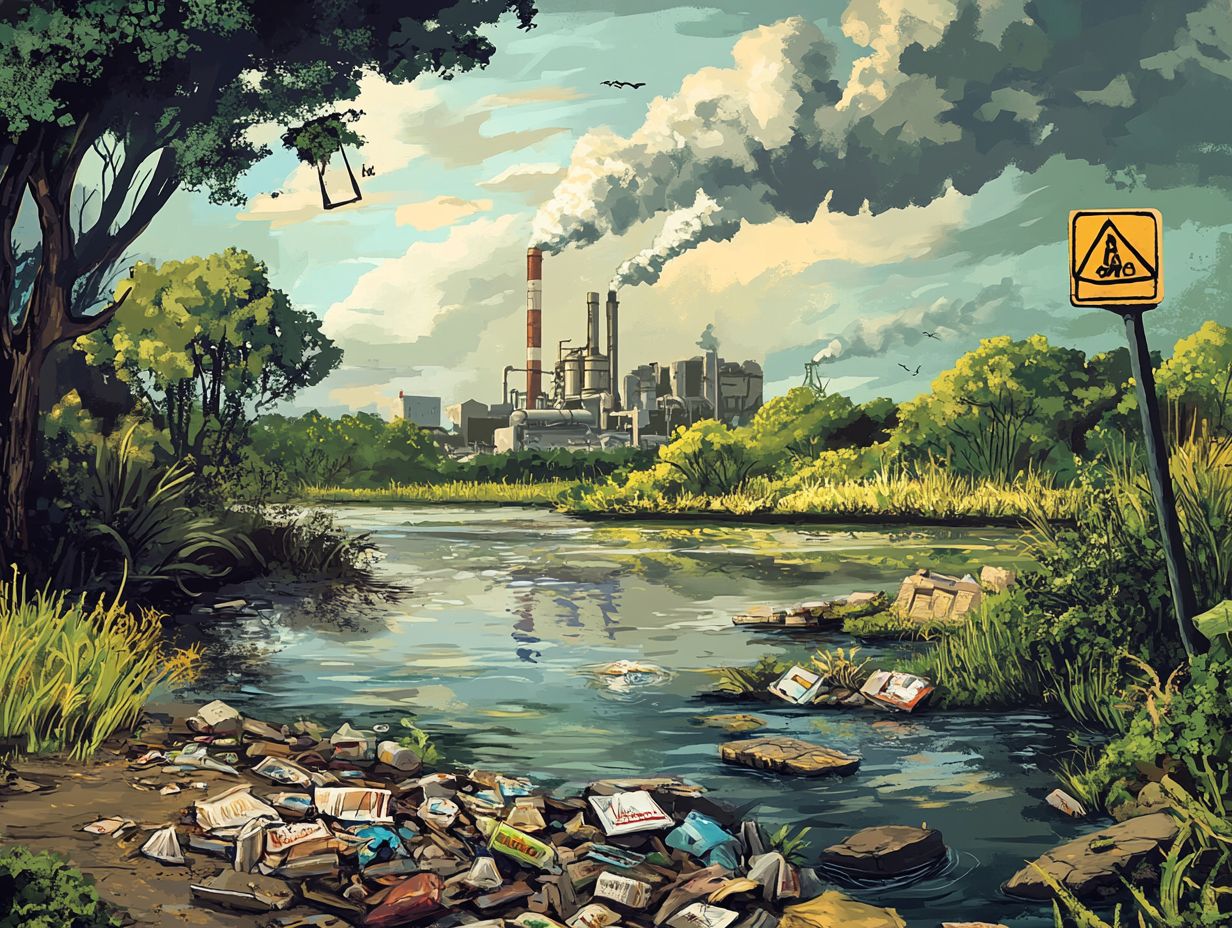Environmental Crimes: What You Should Know
Environmental crimes present a substantial threat to our planet, impacting ecosystems, wildlife, and human health in profound ways.
This article explores various forms of environmental crimes, such as pollution, illegal dumping, wildlife destruction, and the illegal trade of endangered animals. It examines the serious consequences these actions have on the environment and public health, along with the legal ramifications for those who commit them.
Additionally, you’ll find practical tips on how you and your community can actively prevent and report these crimes.
Engage with us as we explore the impact of environmental violations and discover the steps you can take to safeguard our world.
Contents
Key Takeaways:

Environmental crimes include pollution, illegal dumping, wildlife destruction, and the illegal trade of endangered animals. These actions harm ecosystems and public health.
Perpetrators of environmental crimes can face legal penalties, fines, and imprisonment. Reporting these crimes to authorities is crucial in preventing and addressing them.
Individuals and communities can take action to prevent environmental crimes by properly disposing of waste and reporting suspicious activities. Together, we can protect our planet and its resources for future generations.
Defining Environmental Crimes
Environmental crimes encompass a range of unlawful activities that breach environmental regulations, resulting in significant harm to public health, ecosystems, and natural resources.
These offenses can involve the illegal dumping of toxic chemicals, violations of the Clean Water Act, and the illegal trade of endangered animals. All of these contribute to ecological degradation, compromise biodiversity, and pose risks to communities.
Agencies like the Environmental Protection Agency (EPA) enforce environmental laws, working tirelessly to protect community health and advance sustainability efforts.
Environmental crimes can also manifest in activities such as hazardous waste management breaches, air pollution violations, and the destruction of wetlands. These actions collectively threaten food security and public welfare.
The implications of such acts are profound, often worsening health disparities in vulnerable populations and leading to increased healthcare costs for communities.
Law enforcement agencies and environmental regulators diligently investigate and prosecute these offenses, ensuring accountability is upheld.
Cultivating a culture of environmental stewardship is essential. It enables you and your community to take proactive steps toward sustainability and conservation, promoting the long-term health of both people and the planet.
Types of Environmental Crimes
Environmental crimes take many forms, such as pollution, illegal dumping, waste management violations, wildlife crimes, and the illegal trade of endangered animals.
Each of these activities undermines efforts to protect the environment and can lead to serious long-term repercussions for ecosystems and public health.
Pollution
Pollution, the unwelcome introduction of hazardous substances into our environment, poses a significant threat to ecosystem services and public health. This often results in stringent regulations under acts like the Clean Air Act and Clean Water Act, designed to mitigate environmental impact.
Surprisingly, many don t know just how pollution affects us all air, water, and soil contamination stem from numerous sources, each contributing to a troubling decline in biodiversity and a rise in health issues.
For example, industrial emissions and vehicle exhaust lead to air pollution that can cause respiratory problems and cardiovascular diseases. Water pollution, frequently originating from agricultural runoff and sewage discharge, endangers aquatic ecosystems and compromises drinking water quality. Soil contamination can arise from improper waste disposal and the use of harmful pesticides.
In response to these challenges, environmental agencies like the EPA conduct thorough investigations to ensure compliance with regulations aimed at reducing pollutants. By implementing sustainable practices and advocating for stronger regulations, we can protect public health and preserve essential ecosystem functions.
This emphasizes the urgent need for both individuals and industries to engage in responsible practices.
Join us in protecting our planet every action counts!
Illegal Dumping and Waste Management
Illegal dumping of hazardous waste violates the Resource Conservation and Recovery Act and poses significant risks to public safety and environmental health. It contributes to long-term ecological degradation and health issues in communities.
When toxic materials are disposed of improperly, they can contaminate soil and water supplies, adversely affecting local ecosystems and agricultural viability. For example, a case in Los Angeles highlighted that careless dumping of industrial waste near residential areas led to a troubling rise in respiratory illnesses among residents.
These actions often reveal a breakdown in environmental regulation enforcement. Local governments find it challenging to implement and uphold effective waste management policies. Complex legal challenges can stymie prosecutions, making it essential for stakeholders to push for stricter compliance measures and establish comprehensive public awareness campaigns.
Environmental advocates emphasize the necessity of understanding the consequences of illegal dumping. By doing so, individuals can help safeguard community health and preserve invaluable natural resources.
Wildlife and Habitat Destruction

Wildlife crimes, including habitat destruction, have a profound impact on biodiversity and disrupt the delicate balance of our ecosystems. Recognizing this need is critical to safeguarding endangered species and their natural environments from illegal activities.
Among these crimes, poaching emerges as a significant threat. It targets not just iconic species like elephants and rhinoceroses for their tusks and horns, but also lesser-known animals that are vital to their ecosystems.
Illegal logging compounds the issue by obliterating crucial habitats and exacerbating the climate crisis. This troubling trend has sparked the creation of various international treaties, such as CITES (the Convention on International Trade in Endangered Species), alongside local regulations designed to protect wildlife.
To make a real difference, effective enforcement of these laws is critical. Raising public awareness is equally important as it encourages community engagement in conservation efforts, ultimately ensuring the survival of our planet s irreplaceable biodiversity. Your involvement can be a key part of this vital mission.
Illegal Trade of Endangered Species
The illegal trade of endangered species represents a form of organized crime that seriously undermines international conservation efforts. It fosters socio-economic challenges and poses a significant threat to biodiversity across various ecosystems.
This illicit trade endangers species and disrupts ecosystems, affecting local communities that depend on these natural resources for their livelihoods.
We must urgently tackle this pressing issue. Nations have developed numerous international laws and agreements, such as CITES, aimed at safeguarding threatened wildlife. Organizations like INTERPOL and the United Nations are instrumental in promoting global cooperation, facilitating information sharing, and coordinating law enforcement efforts across borders to dismantle trafficking networks.
This collaborative approach is essential in the battle against wildlife crime, ensuring that diverse ecosystems remain intact for future generations.
Consequences of Environmental Crimes
The consequences of environmental crimes reach far beyond mere legal penalties and fines.
They can have profound effects on ecosystems, public health, and economic stability, ultimately placing communities at significant risk.
Impact on Ecosystems and Public Health
Environmental crimes present significant threats to ecosystems and public health. They lead to heightened pollution levels, deteriorating air and water quality, and long-lasting health issues for communities exposed to toxic substances.
Consider, for example, the illegal dumping of hazardous waste. It can infiltrate groundwater, resulting in increased lead levels that pose serious developmental risks to children.
Likewise, air pollution stemming from industrial emissions has been directly associated with respiratory diseases, including asthma and chronic obstructive pulmonary disease (COPD).
In simple terms, these pollutants upset the fragile balance of ecosystems, jeopardizing wildlife and reducing biodiversity. These health risks underscore the pressing need for stringent regulations and protective measures.
By advocating for proactive legislation, you can help mitigate the impact of such crimes and safeguard both the environment and the well-being of communities.
Legal Penalties and Fines
Legal penalties and fines for environmental crimes can vary significantly, reflecting both the severity of the offense and the dedication of law enforcement and government agencies to uphold environmental statutes and prosecute offenders effectively.
These frameworks deter individuals and corporations from endangering ecosystems and public health.
For example, the Environmental Protection Agency (EPA) conducts thorough investigations into suspected violations, often uncovering extensive environmental damage. High-profile cases, such as illegal dumping of toxic waste or violations of the Clean Water Act, demonstrate the judicial system’s ability to impose significant penalties.
The ripple effect of these prosecutions serves not only to penalize offenders but also to elevate community awareness regarding the environmental responsibilities that everyone must maintain.
Preventing and Reporting Environmental Crimes

Preventing and reporting environmental crimes is not just a responsibility; it is an opportunity for you and your community to engage proactively.
By fostering a culture of environmental stewardship, you can collaborate effectively with law enforcement agencies, ultimately safeguarding public health and preserving ecological integrity.
Your active participation can make a significant difference in protecting the environment for future generations.
Individual and Community Actions
You and your community hold a crucial position in the fight against environmental crimes through actions that champion environmental stewardship, sustainability, and the safeguarding of ecosystem services.
Join the fight! Consider organizing clean-up drives in local parks, rivers, and beaches. Not only will you enhance your surroundings, but you’ll also raise awareness about the importance of effective waste management.
Educational workshops on recycling and composting can enable you and your neighbors to minimize your waste footprint. Plus, community gardens serve a dual purpose: they provide fresh produce while cultivating a sense of cooperation and a deeper connection to the environment.
Engaging in advocacy, whether by attending town hall meetings or signing petitions, can motivate local governments to implement stronger environmental policies.
By collaborating with wildlife conservation organizations, you can actively participate in initiatives that protect endangered species and restore natural habitats, ultimately contributing to a more balanced ecosystem.
Reporting to Authorities
Reporting environmental crimes to the appropriate authorities is essential for effective enforcement and mitigation. It enables law enforcement agencies to respond swiftly to community risks and safeguard public health.
You play a vital role in this process; your observations and reports can lead to significant interventions. By raising awareness within your neighborhood about various violations like illegal dumping or hazardous waste disposal you can become the eyes and ears for enforcement personnel.
Act quickly when you see something suspicious! The faster you alert the authorities, the better chance we have of protecting our ecosystems.
Fostering a culture of vigilance and responsibility not only enables you but also strengthens the collaboration between community members and environmental protection agencies.
Frequently Asked Questions
What are Environmental Crimes?
Environmental crimes are illegal activities that harm the environment, wildlife, or natural resources. This includes pollution, illegal dumping, poaching, and habitat destruction.
Who Commits Environmental Crimes?

Individuals, corporations, and governments can all commit environmental crimes. For example, individuals might dump waste illegally, while corporations might cause pollution.
Governments can also be responsible, engaging in activities like illegal logging or mining.
What are the Consequences of Environmental Crimes?
Environmental crimes can have serious consequences. They can damage ecosystems, harm wildlife, and negatively affect human health.
Those caught committing these crimes may face hefty fines or imprisonment.
How Can I Report an Environmental Crime?
If you see or suspect an environmental crime, report it to local authorities or environmental agencies. You can often report it anonymously through hotlines or online systems.
What is Being Done to Prevent Environmental Crimes?
Governments and organizations are taking steps to combat environmental crimes. They are enforcing stricter regulations and increasing penalties.
You can help by disposing of waste properly, supporting sustainable practices, and reporting suspicious activities.
How Can I Learn More About Environmental Crimes?
To learn more, research online, read articles or books, and attend workshops. Get involved with environmental organizations to further your knowledge and contribute to protection efforts.






